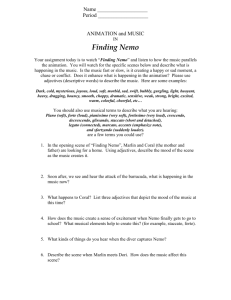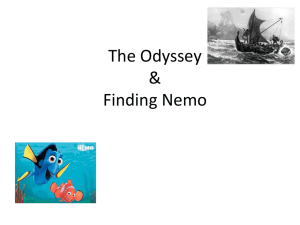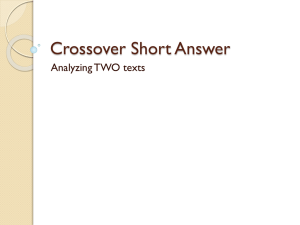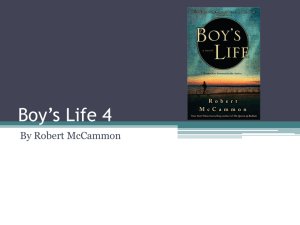Finding Nemo - VCCS Litonline
advertisement
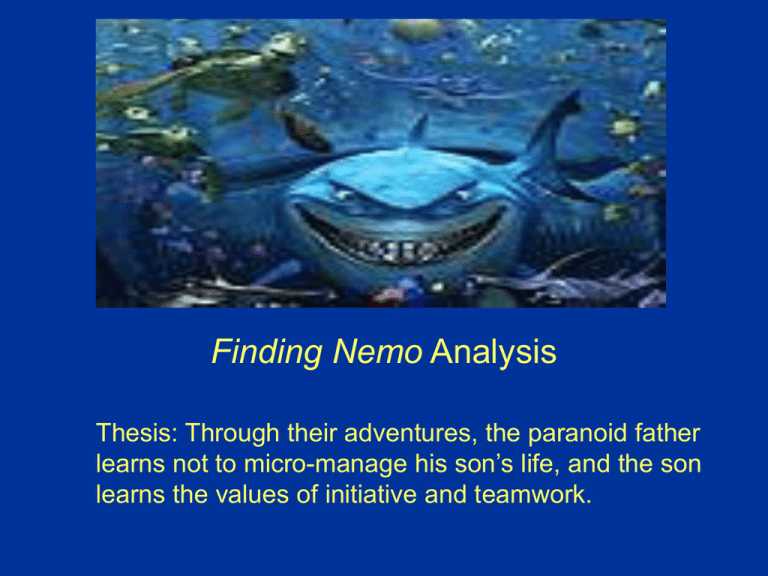
Finding Nemo Analysis Thesis: Through their adventures, the paranoid father learns not to micro-manage his son’s life, and the son learns the values of initiative and teamwork. By: •Dawn Castlebury- PowerPoint Presentation, Plot Summary, Colors, Light vs. Shadow. •Kelly Felts- List of Characters, Camera Angles, Scene Summary. • Lashanda Jones- Props, Costumes, Blocking. •Sara Burton- Setting, Sounds, Music. Characters • • • • • • • • • • • • • • • Nemo- Marlin & Coral’s surviving son (protagonist) learns to survive in the open ocean—and the value of home. Marlin Dori- Befriends Marlin and helps him find Nemo; forgetful and impetuous Coral- Nemo’s mother who dies in attack with all her eggs but one Crush-The big, old turtle who teaches Marlin to let kids struggle a bit on their own; Squirt’s pop Squirt- One of the baby turtles; Crush’s son Mr. Rays- Manta Ray; Nemo’s teacher Bruce- Biggest shark who struggles with “Fish are friends, not food.” Tank Gang Gill-big, scarred fish; clever but grim Blow-blowfish who inflates when startled Jacque- crab; compulsive cleaner Auntie Deb- blue fish with stripes Peach-starfish and lookout Darla-destructive metal-mouth niece of the dentist Nigel- the pelican that hears of Marlin’s quest and saves Nemo from the seagulls Plot Summary • Nemo, a young clownfish is caught by a scuba diver when he ventures into the open ocean and is taken to an aquarium in a dentist’s office. While Marlin, his father, overcomes his fears of the ocean to find his lost son, he meets Dory, who has a very short memory. Marlin and Dory search for Nemo, encountering many types of ocean life. Eventually news spreads about Marlin’s quest and Nigel, a pelican, comes to the tank to rescue Nemo and reunite him with his father. • “Finding Nemo” is set in the ocean between the home of Marlin and the East Australian Current and the Australian dentist’s office in Sydney. The story of a lost child and his father’s adventure and mission to reunite them is all depicted and played out in this vast area of the southern Pacific. Overall, the director used the ocean as a microcosm to satirize human foibles while showing a quest for serenity. In SCENE # 17, Nemo has been placed into the fish tank by the dentist. After he is ceremonially welcomed to the tank, Gill reveals his plan for escape—which requires a small, strong fish. The tank gang has to act before Nemo is given to Darla, an insensitive human girl who kills fish just by looking at them (and shaking them to get them to perform for her. Nemo’s dad, Marlin, a clown fish has told other fish about his quest to find Nemo and those fish told more fish who tell more. Finally, the pelican, Nigel, who has met Nemo, hears the story and alerts the tank gang. Nigel rescues Nemo and Dory, who has found him after splitting with Marlin, and gets them to the harbor near the dentist’s office. Nemo plays dead in order to get rinsed into the sewer system that eventually vents into the harbor, where he runs into Dory, who leads him back to Marlin. In the end, Nemo not only rescues himself, but he also rescues Dory with his father’s trust and aid. Sound Effects Sound effects during this particular scene of the film help foster realism and set the scene shift. Specific sounds are heard while in the East Australian Current (EAC) with the quick moving of the water and the sounds of each sea turtle. A specific sound of Dory and Marlin exiting the EAC is heard, and then a quiet lull is present. The quietness helps with the transition of setting from the current to Sydney harbor. Bubbling, waves, seagulls “barking”, and Dory and Marlin’s swim are an example of the specific sounds that are heard during this scene. The DVD reveals that the sound of Nemo’s malformed fin was made with fluttering tissue paper. Sounds During the movie sound and sound effects are an essential part of the development and progression of this movie. Disney uses multiple sounds to depict characters and to essentially describe the ocean in sound. With many of the main characters a specific sound is used to identify the character. Nemo is identified by his damaged fin. The fin makes a distinctive fluttering sound, which establishes that he has less use of this fin. Marlin, the overprotective father of Nemo has a very fast moving tail. One could say that this shows how neurotic and overprotective his father is. Dory, the companion of Marlin on his mission to find Nemo, has a smooth glide to her fins and tail. This shows that she is going through life with a good attitude and enjoying everything she does with no concerns. This also shows her mental flightiness (amnesia). Each shark has a deep protruding voice showing dominance and strength. Props 2nd Setting in the Scene: The Harbor 1st Setting in the Scene: The Ocean Leaves, flowers, sand, rocks, and a treasure chest set the scene in the open ocean. Trees, bushes, land, boulders in the water, boats, and the Sydney Opera House in the distance set Sydney Harbor. 3rd Setting in the Scene: The Tank In the fish tank, an old rusted container, blue, rocks, bubbles, plastic pink tall plants, a sea shell with a pink ball inside, tall plastic green plants, the filter, and beyond the glass the dentist’s chair and tools, his patients, cabinets, pictures on the wall. The window overlooks the harbor, and Nigel. Costumes Semi-Realistic Cartoon Animations of the Underwater World Nemo's father (Marlin) * orange & white with a outline of black on fins * big white eyes * small framed mouth Nemo * small orange fish * orange, white and with a little trim of black Turtles * green, with a darker green in certain areas on shells Crabs * orange & yellow, and small, green * with claws & pincers Pelicans * long wings * long faces Dori * blue fish * yellow tail * big eyes that blink blankly to show her forgetfulness Seagulls * short beaks to bark “Mine!” * wings * small, blank eyes Fish *Different colors for different species Dolphins * grey and white * long bodies Light vs. Shadow There were shadows of the sea life on the ocean floor from the sunlight—which took a lot of trial and error by the animators. There were also reflections on the ocean from the sun, stars, moon, and the city lights. The most effective scene was the initiation ceremony to welcome Nemo into the tank in order to establish him as a member of the escape team. Colors • The colors in Finding Nemo were mostly shades of blue and green, since it takes place underwater. • The underwater plant life consisted of all different colors such as, purple, green, pink, yellow and many other colors. • The characters (fish) were the most colorful from the bright orange clownfish and the blue and yellow blue tang fish. • One effective scene showed a meeting of the sharks that used gray shades for their sinister environment to show they differ from the brightly colored fish. Camera Angles • The camera angles under the water are mostly looking from a side view, sometimes straight at the characters in order to show their normalcy. • Sometimes, the camera looks down into the water, reminding us the usual perspective we humans see from the world above. • Shots from the tank sometimes show Nemo, as well as the marina outside the dentist’s window in Sydney harbor. • Many of the shots in the tank look down at the characters to show their smallness, especially Nemo in the filter tube; but some shots look out into the dentist’s office to help establish that the fish are familiar with his procedures and tools, so they must have been there for a long time, which implies a sinister future for Nemo. Selected positions for scene 17 In the EAC • The fluid motions of the turtles show how they have adapted to traveling in the swift Eastern Australian Current. • Marlin’s confusion and Squirt’s getting bumped out of the current show the speed of the current, as well as the contrast between the harbor and the current after Marlin and Dory have exited. Inside the whale • The rush of water and the rolling of Dory and Marlin on the whale’s tongue establish the danger of their situation, which Marlin and the audience feel, but Dory ignores because she is fascinated by the experience as she learns to “speak whale.” The Crab vs. the Seagulls • When a crab is tossed into the center of a bunch of seagulls, humor and irony follow. • The crab on the rock, though surrounded, is not defenseless. The gulls fear his snapping claw and eventually lose him as he escapes into the water. • The stupidity of the gulls is established when all of them shout “Mine!”—with one shouting “Mine!” even after the crab has escaped into the water. The Pelican vs. the Dentist • One wacky scene, involving a lot of slapstick, shows Nigel, the pelican, loose in the dentist’s office, creating chaos. • The mismatch between the pelican and the dentist’s tools, glass cabinets, and his frustration at not being able to keep the bird off his equipment all create a mad scene. Nemo vs. the Filter • The contrast between Nemo’s first, unsuccessful attempt to stop the filter and his second, successful attempt makes Nemo look even braver. • Especially when Nemo struggles up the tube, we can see his fear the first time and his determination the last time.


